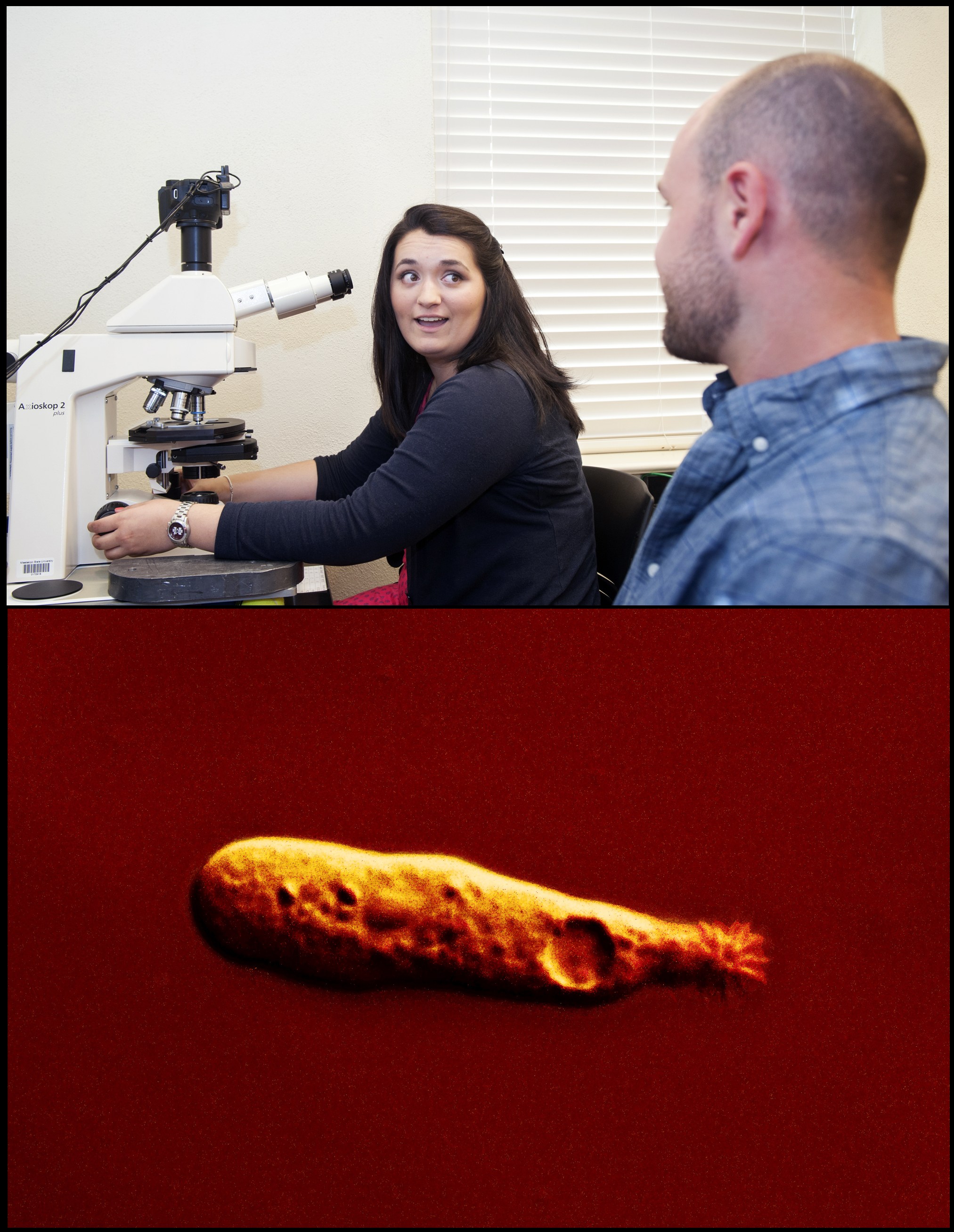Contact: Leah Barbour

Bottom-Ptolemeba bullienesis, the unicellular, microscopic protist discovered at the university, was named for the first bulldog mascot, Ptolemy. This cell, magnified 160 times, measures 35 micrometers.
A previously unknown organism was recently discovered at Mississippi State University.
Ptolemeba bulliensis, a unicellular microscopic protist, was scooped from a courtyard mud puddle located between Harned Hall and its adjoining annex in September 2013. It was collected, isolated and classified by three undergraduates under the leadership of Matthew Brown, an authority on the evolution of amoeboid microbes.
Brown, an assistant professor at MSU, heads the Evolutionary Protistology Laboratory in Harned Hall, home of MSU's biological sciences department. In the lab, Brown teaches students techniques for isolating and describing morphological and molecular characteristics of microscopic organisms.
A second, closely related protist, Ptolemeba noxubium, was also collected from the Sam D. Hamilton Noxubee National Wildlife Refuge, located approximately 15 miles south of campus on more than 48,000-acres in Noxubee, Oktibbeha and Winston counties.
The organisms' genus--Ptolemeba--honors MSU's first bulldog mascot, said Pamela M. "Pam" Watson of Murfreesboro, Tennessee. The junior microbiology major was lead author of the scientific paper about the discovery of the protists recently published in the Journal of Eukaryotic Microbiology, a feature publication of the International Society of Protistologists.
In her spare time, Watson is a member of Maroon VIP, or Visitor Information Program. Participating taught her more about the history of MSU and led to her choice of the genus name.
"We take care of visitors who come to campus," Watson said. "When I went to Maroon VIP meetings, I learned that the first 'Bully' was named Ptolemy, and I thought that would be fitting for us to name the genus for something about the campus.
"It catches your attention; you want to know more about it and it highlights the history of Mississippi State."
Watson, along with senior medical technology major Stephanie C. Sorrel of Warner Robins, Georgia, and junior chemistry major Nicholas R. Lee of Brandon, were working in Brown's laboratory when the samples were collected. They participated in documenting and classifying the protists, though Lee was unable to continue the project through the completion of the scientific paper.
Since the students collected the organisms, Brown said they deserved the opportunity to experience the entire scientific process of organism discovery, from isolating samples to isolating the protists' DNA to drafting the highly technical journal submission.
Watson said Brown's interest in unicellular creatures and their position on the evolutionary tree inspires her own passion for science and research. Not only did she switch her academic major from biochemistry to microbiology, she also changed her intended career track.
"While the paper process was one of the most stressful experiences of my adult life, it changed what I wanted to do," she said. "I was pre-med, but now I've found my niche. I want to go to grad school, get my Ph.D. and do research. I want to be a professor.
"This is my calling: I want to make more discoveries," she emphasized.
Because most of his contemporaries are not studying protists, Brown has especially enjoyed training student-scientists to investigate the tremendous biodiversity found in the group, he said.
He said the students' report of their discovery constitutes the first independently published manuscript produced by his MSU lab.
"I was showing the students the morphological and molecular techniques to identify the organisms and place them on the phylogenic tree," the University of Arkansas doctoral graduate explained. "The 'aha moment' came in early November when all three of the students were working in concert. Each isolated an organism, and each did the gene sequencing analysis, and all the organisms were so closely related.
"Things just don't happen that way; it was serendipity."
Watson was given the distinction of lead author since she was the first to get the complete data on Ptolemeba, Brown said.
"She had to do lots of reading, and it can be monotonous and boring, but she did a lot of the work and all of the technical work," he said. "It's really impressive."
Brown said he hopes the students' groundbreaking achievement will alert the larger scientific community to the commitment of MSU biological science research. The lab will be open to more student researchers this fall.
Visit mwb250.biology.msstate.edu to learn more about MSU's Evolutionary Protistology Laboratory.
More information about MSU can be accessed at www.msstate.edu.